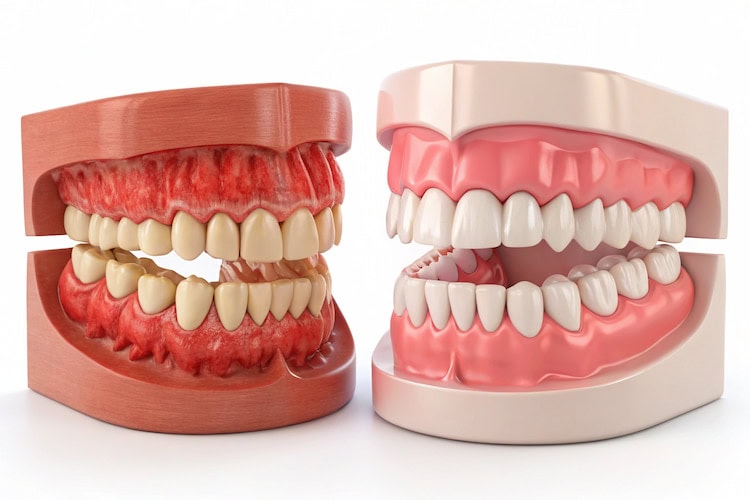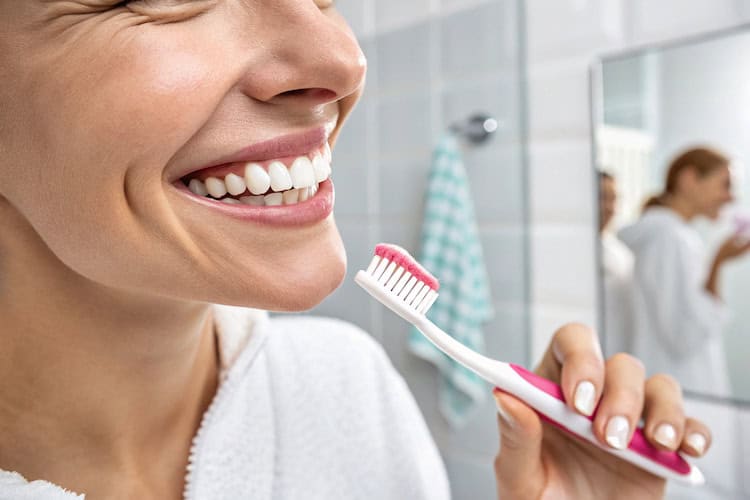If you’ve ever seen a pink tinge in the sink after brushing, your gums may be signaling irritation or inflammation. Bleeding gums are often linked to plaque buildup, gingivitis, or improper brushing. The good news is that learning “How to Stop Bleeding Gums When Brushing” is simple with the right care. Gentle brushing, daily flossing, using an antibacterial mouthwash, and regular dental checkups can stop the bleeding and restore gum health.
This guide explores the causes of gum bleeding and practical steps to keep your smile fresh, healthy, and strong.
Principal Reasons for Bleeding Gums When Brushing
Most cases of bleeding gums can be attributed to a few core issues. Understanding them is the first step to solving the problem.
Gingivitis – Early Gum Disease
Gingivitis is the leading cause of bleeding gums. It develops when plaque, a sticky film of bacteria, builds up along the gumline. This irritates the soft tissue, causing redness, swelling, and bleeding during brushing or flossing.
Gingivitis is reversible with consistent oral hygiene and professional dental cleanings. If left untreated, it can progress to periodontitis, a more severe form of gum disease that can cause damage to teeth and bone.

Poor Oral Hygiene Habits
Skipping flossing, brushing quickly, or not cleaning along the gumline allows plaque and tartar to irritate the gums. Even if you brush twice a day, missing those tricky spots between teeth can lead to bleeding and, over time, even tooth decay that might require professional treatment for cavities and fillings at your dentist’s office.
When plaque is left behind daily, gums stay inflamed. Learning to brush correctly and clean between teeth makes a huge difference in keeping both your gums and teeth healthy.
For more ways to keep your mouth healthy beyond brushing and flossing, check out our tongue care tips to learn how cleaning your tongue can improve oral health and freshen your breath.
Plaque and Tartar Buildup
Once plaque hardens into tartar, no amount of home brushing can remove it. This hardened layer traps bacteria against your gums, causing persistent irritation and bleeding.
You can’t remove tartar at home; only a dental hygienist can clean it off safely. That’s why regular dental cleanings are crucial to stop gum bleeding.
Stop Gum Bleeding and Protect Your Smile!
Our friendly team at Tsawwassen Family Dental specializes in gentle cleanings and preventive care to restore your gum health.
Secondary Factors Contributing to Bleeding Gums
Some people notice gum bleeding even with good oral care. That’s because other health and lifestyle factors can make gums extra sensitive.
Brushing Too Hard or Using a Hard-Bristled Toothbrush
Aggressive brushing can harm your gums instead of helping them. Using a soft-bristled brush and gentle circular motions cleans effectively without damage.
Solution: Switch to a soft-bristled toothbrush or an electric toothbrush with a pressure sensor to protect your gums.
Vitamin Deficiencies
Your gums need proper nutrition to stay strong:
- Vitamin C keeps gums healthy and supports healing.
- Vitamin K helps your blood clot properly, preventing prolonged bleeding.
Eating a diet rich in citrus fruits, berries, leafy greens, and fresh vegetables can naturally support your gum health.

Hormonal Changes
Pregnancy, menstruation, or hormone therapy can make gums more sensitive. These temporary hormonal changes increase blood flow to your gums, making them swell and bleed more easily.
Certain Medications or Health Conditions
Certain conditions can also trigger gum bleeding:
- Blood thinners reduce clotting, so minor irritation leads to bleeding.
- Diabetes can weaken gum tissue and slow healing.
- Immune issues or systemic illnesses can also affect gum health.
If bleeding continues, consult both your dentist and doctor to rule out any underlying health concerns, and remember that for unexpected situations, you can explore handling dental emergencies to know what steps to take.
For a deeper look at the common causes of bleeding gums and what they might mean for your oral health, check out this detailed guide from Medical News Today.
Interventions to Prevent Gum Bleeding
Stopping gum bleeding is not about a single quick fix; it’s about giving your gums the attention they need every day while addressing any underlying problems. Healthy gums require a combination of good home care, proper nutrition, and professional dental support. Let’s look at the steps in detail.
Improve Your Oral Hygiene Routine
Brush gently twice a day with a soft-bristled toothbrush and fluoride toothpaste. Don’t skip flossing, it removes bacteria your brush can’t reach. Over time, healthier gums bleed less.
Schedule Professional Dental Cleanings
Seeing your dentist or hygienist at least twice a year helps remove stubborn tartar and catch gum problems early. If you already have gingivitis, a professional cleaning can reverse it before it worsens.
Upgrade Your Toothbrush
Switching to a soft-bristled or electric toothbrush can make a big difference. Electric brushes are designed to clean efficiently without putting too much pressure on your gums.

Maintain a Gum-Healthy Diet
Include foods high in Vitamin C (like oranges and bell peppers) and Vitamin K (like spinach and kale). Staying hydrated and reducing sugary snacks also supports gum health.
Use an Antimicrobial Mouth Rinse
Rinsing with a dentist-approved mouthwash can reduce bacteria and help soothe inflamed gums.
Seek Professional Advice for Persistent Bleeding
If bleeding continues for more than a week despite improved care, visit your dentist. You may need a deep cleaning or treatment for underlying gum disease.
Sum Up
Bleeding gums are your mouth’s way of asking for attention. By improving daily brushing and flossing, switching to a gentle toothbrush, eating a balanced diet, and visiting your dentist regularly, you can stop gum bleeding and protect your long-term oral health.
Ready to take care of your smile? Book your professional dental cleaning at Tsawwassen Family Dental today and enjoy the confidence of healthy, bleeding-free gums.
FAQs about How to Stop Bleeding Gums When Brushing
-
Why do my gums bleed when I brush?
The most common reason is gingivitis caused by plaque buildup. Other causes include aggressive brushing, hormonal changes, or vitamin deficiencies.
-
Can brushing too hard cause bleeding gums?
Yes. Brushing with excessive pressure or using a hard-bristled toothbrush can irritate your gums and cause bleeding.
-
How long does it take to stop gum bleeding?
With improved oral hygiene and gentle care, mild gum bleeding can stop within a week or two. Persistent bleeding requires a dental check-up.
-
Should I switch toothbrushes to stop bleeding?
Yes. A soft-bristled toothbrush or an electric brush is gentler and more effective for sensitive gums.
-
When should I see a dentist for bleeding gums?
If bleeding lasts longer than a week, is severe, or is accompanied by swelling or pain, schedule a dental visit promptly.
-
Can gum bleeding lead to tooth loss?
If untreated, bleeding gums caused by gum disease can progress to periodontitis, which may eventually cause tooth loss.
-
Will flossing make my bleeding gums worse?
Initially, bleeding may increase if your gums are inflamed, but regular gentle flossing strengthens gums and reduces bleeding over time.
-
Can mouthwash alone stop bleeding gums?
Mouthwash can help reduce bacteria and soothe gums, but it should complement, not replace, proper brushing, flossing, and professional care.
We’d love to hear from you!
Have you ever dealt with bleeding gums? Share your tips and experiences in the comments below!


